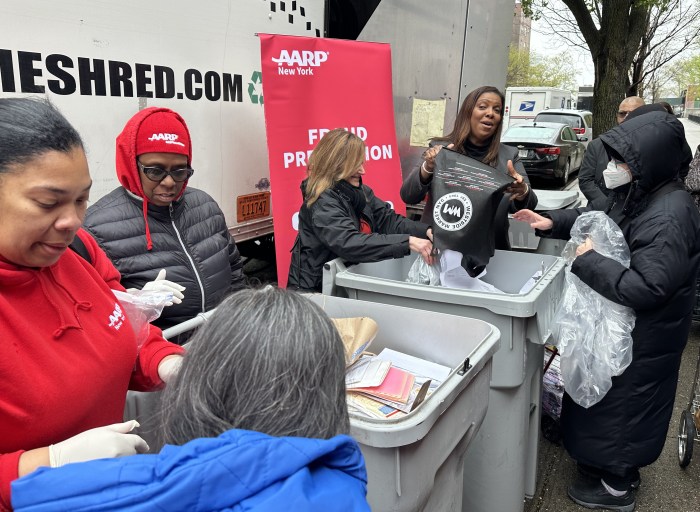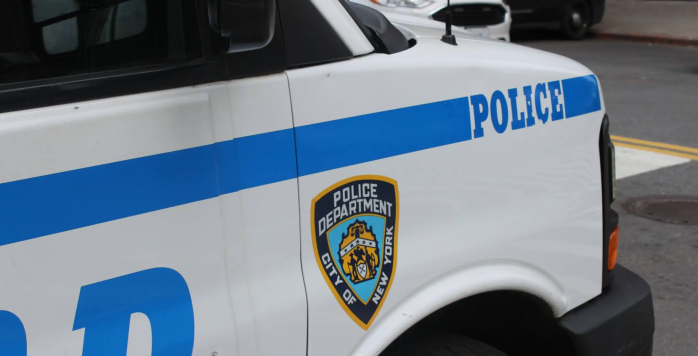
BY SAM SPOKONY | After heaps of complaints from Soho residents about the number of street vendors along Broadway, Community Board 2 is calling on Mayor Bloomberg to take action by reconvening a city review panel that hasn’t been used in more than a decade.
The resolution, which C.B. 2 passed unanimously last week, ultimately seeks to limit the amount of vendors allowed to operate on the stretch of Broadway between Houston and Canal Sts.
“The proliferation of vendors [along that] corridor constitutes a serious and immediate threat to the health, safety and well-being of the public and local residents on the weekends,” the resolution states, “in that sidewalks are too congested by pedestrian traffic to permit the [current number of vendors].”
Many Soho residents have said that those problems are compounded by a lack of consistency and overall effectiveness in the city’s enforcement of current street vendor regulations, such as one that is supposed to stop vendors from operating within 20 feet of a building’s entranceway.
To address the entire issue, C.B. 2 now wants Bloomberg to convene the city’s Street Vendor Review Panel, which would include members of the departments of Small Business Services, Transportation and City Planning. The panel was first created in 1995, but it has not been convened since 2001 — the year before Bloomberg first took office.
The Mayor’s Office did not respond to requests for comment.
Pete Davies, a Broadway resident for more than 30 years and neighborhood activist, lauded the C.B. 2 resolution, saying that he and his neighbors — a group called the Broadway Residents Coalition — have been trying to “make some noise” about this issue over the past year.
“We’re very happy to see this, since the review panel is really the key to getting things back together,” Davies said. “The system is just broken right now.”
He explained that his group has been counting the number of vendors along Broadway each weekend for about a year, and claimed they’ve found that there are around 100 total vendors located between Houston and Canal Sts. during a typical weekend day. Around 30 percent of those are food carts, according to Davies’s estimations.
The C.B. 2 resolution specifically highlighted those larger food vendors, which generally use their own diesel fuel generators and have garnered additional complaints for their allegedly careless disposal of cooking grease.
Another of Davies’s points that was mentioned in the resolution was one regarding food carts left on the sidewalk overnight. To do so is a violation of city regulations, but Davies said that his group has found about a dozen carts left overnight, specifically between Houston and Broome Sts.
Sean Basinski, director of a wing of the Urban Justice Center that advocates for the rights of street vendors, declined an interview to discuss the matter, instead sending a statement that revealed an apparently hyperbolic and tangential interpretation of the C.B. 2 resolution.
“Street vendors are a vital part of New York, and Lower Broadway is a busy commercial strip that is enhanced by the presence of vendors,” Basinski said. “Rather than trying to ban vending there, we encourage the community board to work with vendors to find solutions that benefit vendors, shoppers and residents alike.”
C.B. 2 did not call for any kind of outright ban on street vending along Broadway. Instead, the resolution recommends — after the convening of the city review panel — that legislation should eventually be passed to limit the number of vendors there.
Pedro Amin, 31, a full-time worker at the Tribeca Taco Truck, which has been located on Broadway between Prince and Spring Sts. for more than six years, said that he often hears complaints from local residents, even though he tries to keep his part of the street clean.
“They mostly complain to us about the crowds on the sidewalk, or sometimes they just call the police,” Amin said. “I feel bad about it, because I just want to work, and support my family. And I always take the time to sweep the street around the cart.”
Like nearly every food cart worker along Broadway, Amin does not own the cart in which he serves tacos all day. Davies stressed that he and his group understand that fact, and that they are not out to pick a fight with employees like Amin.
“We understand that people who work out there are trying to earn a living, and they’re working their butts off,” Davies said. “And a bad part of this is that when the city issues a violation to one of the employees, rather than the owner, they’re penalizing the wrong person.”
Instead, as the C.B. 2 resolution stated, Davies puts the onus on the city to analyze this situation and come up with effective solutions.
“These food cart workers, along with the residents, are simply being ill-served by the city right now,” he said. “The mayor has allowed this problem to mushroom by not convening the Street Vendor Review Panel at all during his time in office, so of course it’s going to be much more difficult to fix now. It’s become an urban planning issue now.
“We just want the city to seriously look at this,” Davies said, “so they can make a real determination about how to move forward.”

















